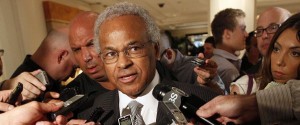Back in 1998, the NBA suffered a huge financial setback and public relations black eye when the league wiped 32 regular-season games and the best it could do was put together a 50-game schedule that started in January. Union executive director Billy Hunter was asked who won or lost in the collective bargaining war and explained that neither side came out unscatched.
“Did we blink? I guess we both blinked,” Hunter said hours after a new deal was reached in January of 1999 to save the season and the playoffs.
Fast forward to 2011 and we are in the same place again. Deja vu!
It’s like a bad Hollywood sequel. “The Lockout II” stars David Stern, reprising his role as the commissioner, and Hunter returns as the union’s embattled executive director. “The Lockout II” introduces a couple of new characters, Derek Fisher replaces Patrick Ewing as the union president and Adam Silver takes over for Russ Granik as the league’s deputy commissioner. However, the storyline and plot remains the same. Ultimately, the big dramatic final scene the players are expecting won’t reach the cutting room floor because the ending has already been written.
Even the script from the league hasn’t changed, just needing some very minor editing. Granik took the podium and addressed the media in 1998 and said the current system is broken. Silver didn’t have the benefit of a podium in 2011 but his message was basically the same. He said on Monday that the current system is broken.
Contrary to what Hunter said 13 years ago, the big winner from the 1998 lockout were the players. Let’s face it, from 2000 to 2010, the players – especially the superstars – enjoyed the fruits of the very long and hard labor debate of ’98. If the players didn’t think they won the last fight, then check out these numbers:
— $19.2 million for Gilbert Arenas.
— $21.2 million for Kevin Garnett.
— $21.3 million for Tim Duncan.
— $22.1 million for Rashard Lewis.
— $25.2 million for Kobe Bryant.
Those were the estimated salaries earned by each player last season. Kobe certainly earned his paycheck but you can argue that the other four were severely overpaid. Arenas was a bit player for the Orlando Magic and has never been the same since multiple knee surgeries. Duncan and Garnett are well past their primes and Lewis’ contract was like stealing money and is the very reason why the system has severe flaws.
The players will argue that nobody put a gun to the owners’ heads when they wrote these massive checks, so the players have a very good argument there. However, the owners will argue that under the current system overpaying for talent is the only way to stay competitive.
Two former NBA players who lived through the 1998 lockout were Charles Barkley and Reggie Miller. Barkley, who now works as a studio analyst for TNT, recently said on NBA TVs “Game Time” that besides revenue distribution the one gigantic issue hovering over this year’s lockout is competitive balance.
“We can’t have all our stars playing in just the major markets. It’s not fair to the game, it’s not fair to the system,” Barkley explained, an obvious strike at LeBron James’ highly debated decision to leave Cleveland for Miami last summer.
“This thing is about competitive balance,” Barkley continued. “Commissioner Stern, who I tell people is the best commissioner in sports and it has been that way for a long time, he’s not gonna let the NBA [become] like pro baseball where it is top heavy. All the teams with the most money get all the stars and then we have 10, 15 franchises dormant. He’s not going to let that happen.”
According to NBA insider David Aldridge, the Los Angeles Lakers’ team payroll reached $110 million last season. Meanwhile, the Sacramento Kings had an estimated team payroll of $44 million.
One way to combat the disparity between the have and the have-nots is having a bonafide superstar in each market. “You can have a bad team in a small market, but at least if you have a star that team can make money,” Barkley said. “You’ve got something to sell to the public. But if you are not gonna have these stars in these small markets they are not gonna survive.”
Miller, who also works for TNT, agrees with Barkley but has a pointed message for the owners. “Stop overspending on these mediocre players!” the former Indiana Pacers guard said on NBA TV. “Maybe you should hire better general managers who can evaluate talent better. There’s no way you give Rashard Lewis $120 million, a 30-year-old shooting guard in Joe Johnson $130 million, Travis Outlaw five years $30 million. Start looking at your general managers. That’s the reason why we are in this mess in the first place because you can’t assess talent well.”
Miller predicts the players will blink and there will be a 50-game season, starting in January. However, Miller also said he wouldn’t be surprised if the whole 2011-12 season is wiped out. Barkley sees a lost season if the players don’t agree to the 50-50 revenue split on basketball related income.
“If they get a 50-50 split they can make money. If they get a hard cap that can work, or they can have a better revenue sharing system,” Barkley said. “The NBA has been preparing not to play this season for two years. When they went through the whole LeBron thing for the whole season, then the Chris Bosh thing happened. Then you have the whole ‘Where is Chris Paul going next, where is Dwight Howard going?’ You can see the NBA saying ‘We’ve got to stop this.’ ”
Joel Huerto is the editor and publisher of OneManFastBreak.net. Follow him @onemanfastbreak.
